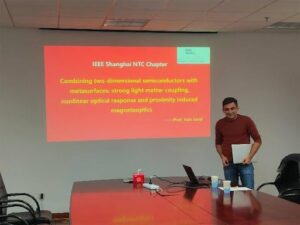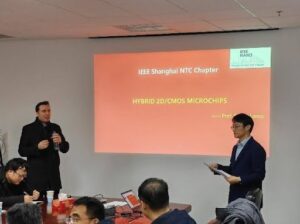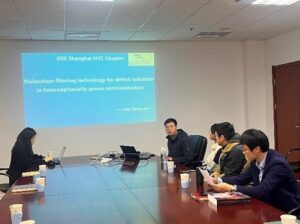From December 2023 to January 2024, Nanotechnology Distinguished Seminars (NDS) were held three times in the IEEE Nanotechnology Council (NTC) Shanghai Chapter, China. NDS Series are proposed and chaired by Prof. Weida Hu from the Shanghai Institute of Technical Physics (SITP) as the Chair of IEEE NTC Shanghai Chapter with Prof. Ivan Iorsh from lTMO University, Prof. Mario Lanza from the King Abdullah University of Science and Technology and Prof. Wenwu Pan from the University of Western Australia. There were totally 48 participants coming from China, Russia, and Saudi Arabia. NDS Series invited experts with various backgrounds to bring cutting-edge nanotechnology knowledge to our students, break down information barriers, and ultimately achieve collaborative development within the organization. A series of insightful presentations showcased groundbreaking developments in nanotechnology. Highlights of the talks included:
• Combining two-dimensional semiconductors with metasurfaces
• Hybrid 2D/CMOS microchips
• Dislocation Filtering Technology for defect reduction on heteroepitaxially-grown semiconductors
Prof. Ivan Iorsh from lTMO University briefly reviewed their recent results on the light-matter coupling in 2D semiconductors integrated with photonic nanostructures. He also discussed how the realization of strong light-matter coupling might facilitate the suppression of the inhomogeneous broadening of excitons and induce a strong nonlinear optical response. Furthermore, He showed how the excitonic properties can be controlled via strong light-matter coupling and finally discussed how one can exploit strong magnetic proximity effect in order to enable magnetooptics with 2D materials.
Prof. Mario Lanza from the King Abdullah University of Science and Technology discussed how to integrate 2D materials in micro/nano-electronic devices, circuits, and microchips, giving a general overview of the global progress achieved in the field and presenting our last developments in hybrid 2D/CMOS applications. He put special emphasis on devices and circuits for memristive technologies, including data storage, computation, encryption, and communication. He also discussed the main technological challenges to face in the next years and provided some recommendations on how to solve them.
Prof. Wenwu Pan from the University of Western Australia showed the use of strained CdZnTe/CdTe superlattice layers as dislocation filter layers for the heteroepitaxy of II-VI CdTe buffer layers on lattice-mismatched III-V GaAs substrates. Their experimental results reviewed here suggest that the dislocation filtering technology is a promising approach for achieving high-quality heteroepitaxy of semiconductors on large-area lattice-mismatched substrates, which is crucial for the fabrication of high-performance optoelectronic devices, especially monolithically integrated devices.
The IEEE NTC Shanghai Chapter Nanotechnology Distinguished Seminar Series was a great success, making all participants rejoice in their contribution to the synergistic development within IEEE NTC Shanghai Chapter and future endeavors in the field of nanotechnology.
- Prof. Ivan Iorsh
- Prof. Mario Lanza
- Prof. Wenwu Pan



